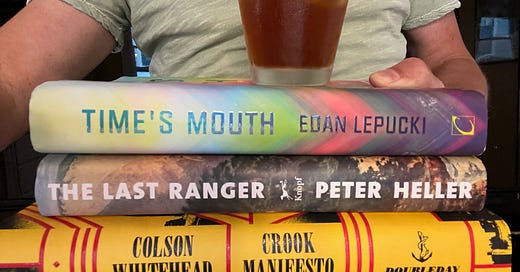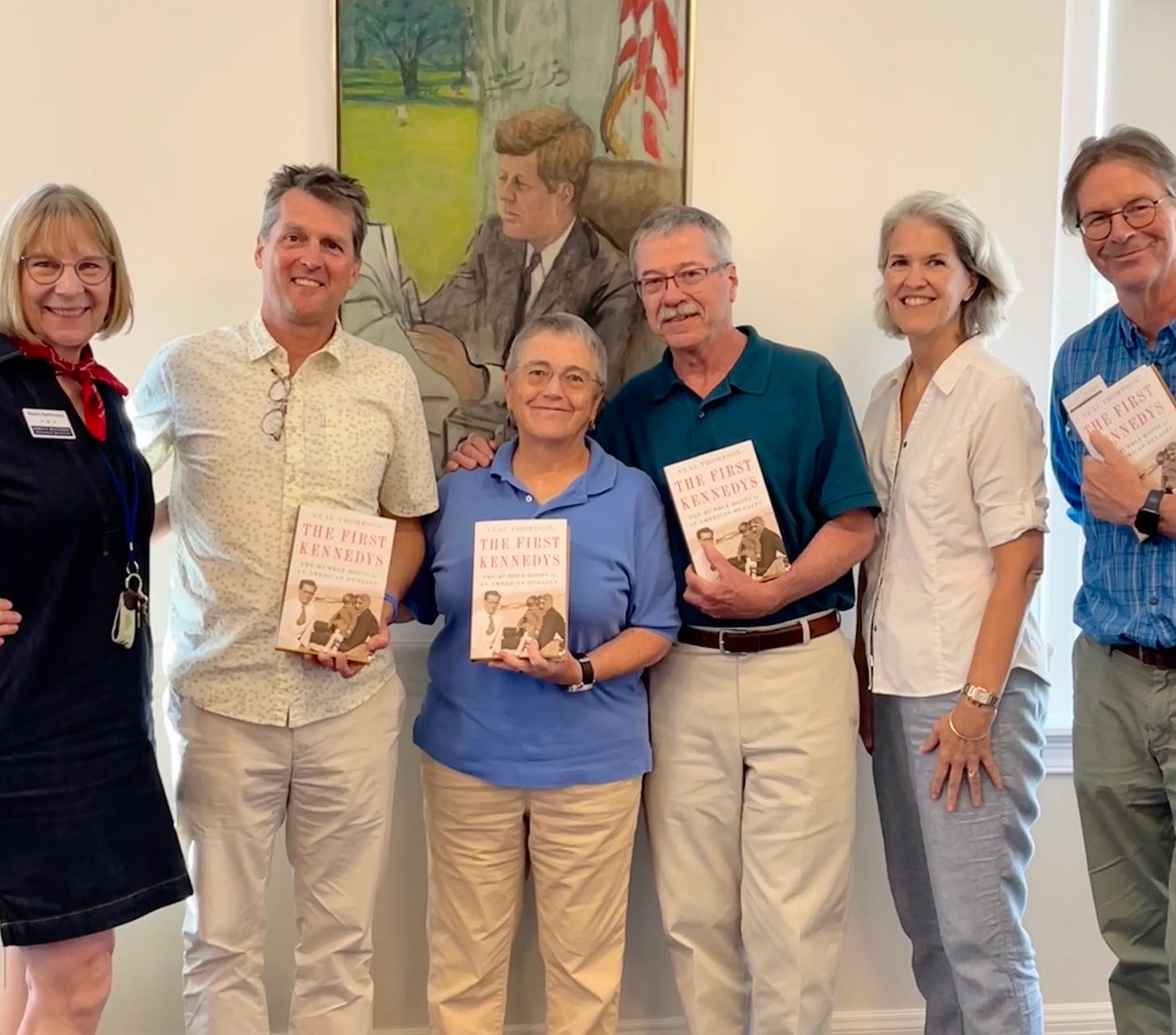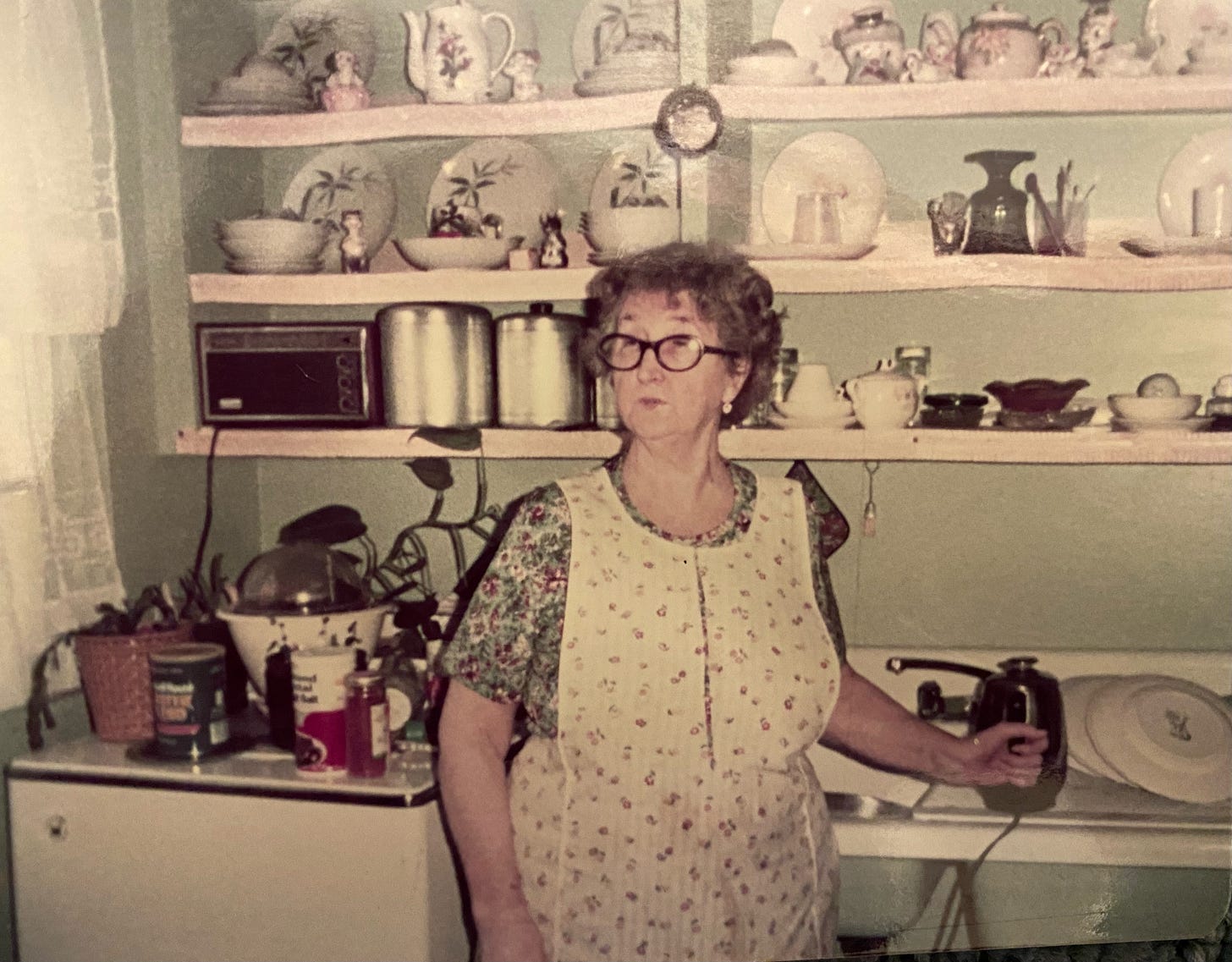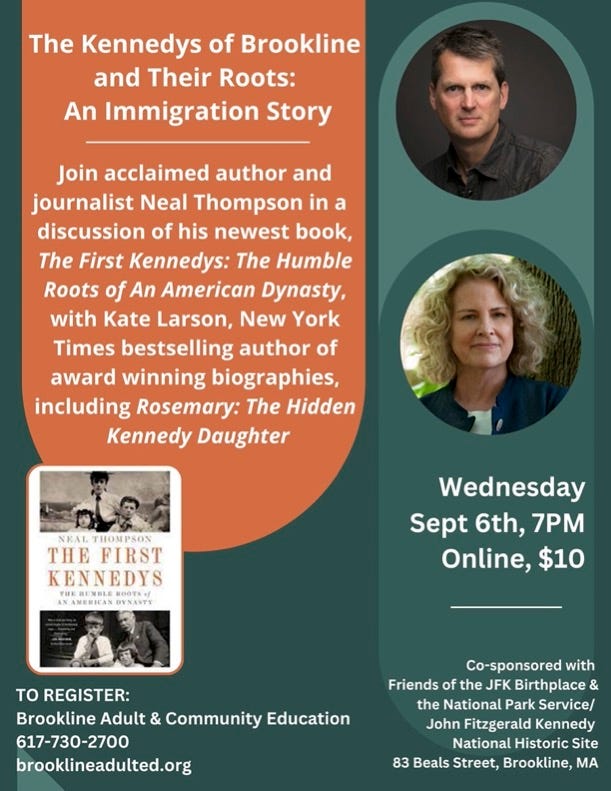Blood & Whiskey #27
New books from Edan Lepucki, Peter Heller, Colson Whitehead, Naomi Hirahara, and more. Plus a rhubarb amaro cocktail and an intro to my Bud-drinking Irish Nana.
Hello friends and readers,
I grew up an hour outside New York and have never lived in LA. For most of my adult life, though, I’ve been drawn to LA fiction — especially crime fiction — far more than New York stories (despite my love of Colson Whitehead’s latest).
If you’ve read more than a few Blood & Whiskeys, you’ve been exposed to this bias. From older classics (Raymond Chandler, Ross Macdonald, Dorothy Hughes) to modern masters (James Ellroy, Walter Mosley, Percival Everett, Michael Connelly, Don Winslow, Kem Nunn) to the next-gen revealers of LA’s underbelly (Ivy Pochoda, Jordan Harper, Joe Ide, Steph Cha), I’m constantly lured by stories from the southern half of the (gritty) Golden State.
Though she lives in and fully captures Los Angeles, I think of Edan Lepucki as an all-California writer. (Hardly fresh insight: her debut novel was California.) And in her third novel, Time’s Mouth, Lepucki again shows a Steinbeck-like sense of the 31st state in the 21st century. This book is packed: weed farming, Y2K, urban oil rigs, the history of microfiche, Vin Scully, LA architecture, film location scouting, Reichian psychoanalysis and orgonic energy. Her Google searches must be insane and probably on some FBI watch list.
The story spans decades, beginning with East Cost Ursa’s escape to Northern California, where she develops a cultish following of young women at the rural mansion where she practices her ability to travel back in time. When her son, Ray, runs off with Cherry, the daughter of one of Ursa’s “mamas,” the story shifts to 1980s LA, where Cherry gives birth to mysterious baby Opal.
Teenaged Opal was my favorite character — funny, smart, weird, snarky. Lepucki is keen observer of teen girls and sassy teen dialogue, with an eye for the weirdly funny. While this story isn’t mystery, per se, it goes deep into the mysteries of family secrets and betrayals. It’s about trauma and parenting and how the two are often the same thing. Also how family can be a cure, too.
At times this was bit of a horror story, too. I finished the book in Covid fog, which oddly worked just right. Lepucki is a visual, visceral writer and her characters are appealingly flawed if not fucked up. Like all of us.
If you missed my recent Q&A with Edan, check it out in the new (and evolving) Interrogations section of Blood & Whiskey: HERE.
Also… it’s looking like I’ll be interviewing Edan and Angie Kim (Miracle Creek) onstage at the Portland Book Festival in November. More on that to come.
Crook Manifesto (Doubleday), by Colson Whitehead
This is Book 2 in Whitehead’s planned Harlem Trilogy featuring Ray Carney, the furniture dealer and stolen goods fence we first met in Harlem Shuffle. This is a book to linger over, sentences dense with action, mood, poetry, and violence. I loved the image of the Twin Towers “looming over the city like two cops trying to figure out what they can bust you for.” And I especially loved Carney’s hulking, violent partner, Pepper, who takes center stage in part 2 of this 3-part story (1971, 1973, 1976), working security for a Blaxploitation film shoot. Pepper, who lives by the “manifesto” of the title (“those who subscribe to lesser codes are cockroaches”) deserves his own sitcom. I was glad he was back for part 3, as he and Carney confront more thugs, crooked cops, and racist punks, trying to survive the chaotic ‘70s of a crumbling city.
Here’s Whitehead (plus S.A. Cosby) on Fresh Air.
The Last Ranger (Knopf), Peter Heller
Heller is so good at capturing the tensions between the natural world and the world of commerce, tourism, and politics. Federal land vs. private property; laws vs. “freedoms.” He’s also attuned to the economics of the wild, the pros vs. the posers; Carhartt vs. Arcteryx. This book is all about these tensions, which roil into anger and violence. It’s class warfare in the wilds of upper Wyoming.
National Park Service ranger Ren Hopper — widowed, wounded — takes on stupid tourists and dangerous poachers while trying to protect his neighbor and eventual lover, Hilly, a renowned don’t-mess-with-me wolf biologist who’s soon being taunted by said poacher. The real character here is “The Park,” as in Yellowstone — part theme park where tourists clutter and try to pet the buffalo and part wilderness where grizzlies roam among wolves.
I don’t know of anyone better at conveying the raw beauty of the wild. “Rich scents of wet earth, swollen creek water, rain-sweetened grass … mist spumed in tatters off the rocky cap of Druid Peak and off the wet black cliffs farther north … clouds splayed like empty linens blown off a line.” Love it. Also eagles that gyre over a river and bull elk that bugles in the dark like “an untuned fiddle bowed in an echo chamber.”
This book taught me why reintroducing wolves is good for the ecosystem and even the climate. It also made me question the sanity of my species. Heller has no beef with humans enjoying Yellowstone’s paradise, he just wishes they’d skim the instruction manual, maybe leave the guns and drugs at home.
I’m hoping to have an “Interrogation” Q&A with Heller to share next week.
On my shelf/radar: Evergreen, Naomi Hirahara; The Stolen Coast, Dwyer Murphy; The Midcoast, Adam White; The Rabbit Hutch, Tess Gunty; An Honest Man, Michael Koryta; Devil Makes Three, Ben Fountain (September); Happiness Falls, Angie Kim (September); The Secret Hours, Mick Herron (September); Distant Sons, Tim Johnson (October)
Watching: Ozark (finally getting back to this, thanks to a touch of the Covid); Oppenheimer & Barbie; William Friedkin’s trippy-great Sorcerer.
Listening: Smartless (so hooked!); Abbott Kahler’s podcast, “Remus: The Mad Bootleg King”; the detective voice on Waze (“Take a right, even if it feels wrong.”)
Writing (with): I usually scribble with Muji pens on Muji notepads. A Wirecutter suggestion prompted me to try the Uniball 207 gel pen. It’s chunkier than my slim Muji’s but I like its roll and flow. Smooth not scratchy. So far so good.
Judging: I judged the Oregon Book Awards (nonfiction) and was impressed with all the finalists but especially liked Leah Sottile’s When the Moon Turns to Blood.
Cocktails of the Month
As my cousin has reminded me, one side effect of these recipes is a liquor cabinet cluttered with bottles used but once. I hear you, Kevin! But let me add one more, this one with some versatility: Amaro Sfumato Rabarbaro — smoked rhubarb amaro. My wine guy talked me into it and I’ve learned it goes well with other spirits — not just bourbon but also tequila and gin.
Sfumato & Tequila (smoky twist on a Manhattan)
2 ounce reposado tequila
1/2 ounce Sfumato
1/2 ounce sweet vermouth
dash of Angostura bitters.
(another version with mezcal, called Thou Shall Not Be Named, from Punch)
Sfumato & Gin (twist on a Negroni)
2 ounce gin
1 ounce sweet vermouth
1/2 ounce Sfumato
For both drinks: combine ingredients with ice in a cocktail shaker; strain into coupe glass or ice-filled rocks glass. Garnish with lemon or orange peel.
I visited the JFK Hyannis Museum in late July for a conversation with my former Baltimore Sun colleague Candy Thomson. The First Kennedys started its life in Hyannis, back in 1999, when I was on assignment for the Sun, covering JFK Jr.’s death. On my way back to Baltimore I drove past the NJ graveyard where my Irish immigrant grandparents were buried, which ignited the idea to explore the origins of the Kennedys. It only took another 23 years. In July, Candy asked me to read this section below, from the final page of The First Kennedys.
Bridget Agnes “Della” Fox1, the oldest of ten, raised on a muddy farm outside Roscommon, left home at 20, choosing New York instead of Boston. She worked as a maid and later a seamstress, met and married Patrick Burke, who drove a streamroller and later Texaco trucks. They lived at 125th and Amsterdam, on the west edge of Harlem, and loved to go out to jazz clubs. When Bridget became a naturalized citizen, she changed her name to Della — “She hated the name Bridget,” an uncle would tell me. At 38, Patrick got sick and died of cancer. My grandmother carried on, a poor and widowed immigrant raising my mother, 12, and two sons, 4 and eight months. Ignoring welfare workers’ suggestion to put the two boys up for adoption, she moved out of an airy apartment above a New Jersey candy store into a small public housing apartment, the same complex of subsidized two-story brick apartments where she’d spend the rest of her days.
Here's what I remember about childhood visits: you kept the percolator plugged in all day, drinking strong black coffee until switching to 8-ounce Bud cans2 in the afternoon. You wore house dresses and clunky shoes. You cursed like a dockworker with the staccato brogue of your County Galway. You didn’t open your own shop or become an entrepreneur. But you did raise a daughter who, after helping raise two younger brothers, became the first in the family to attend college, then became a nurse, inspiring her brother to attend college and become a doctor. You always wanted me to be a TV newsman, like your favorite, Dan Rather. I chose print instead, and you died just months after I started my first newspaper job. Like Bridget Kennedy, you created the opportunities that allowed your children and grandchildren to become what they dreamed of becoming. Your story, like Bridget Kennedy’s, is the story of the multitudes of immigrants who “have enriched and strengthened the fabric of American life,” as JFK put it. This book aspires to be the story of all such Bridgets.
One more First Kennedys event upcoming — a (virtual) chat with the fantastic Kate Clifford Larson (Rosemary, Walk With Me) on Sept. 6 (click the image):
Until next month…
-Neal
Find me @ Instagram; sometimes Facebook, LinkedIn, Goodreads.
Della has been on my mind lately. Although my mother died in 2007, her brother — my Uncle Jack — died this summer, less than a year after my Uncle Bob ended up in a long-term memory facility. But… the Burkes of America are going strong. I’ve spent the summer outside Boston near two of three Burke cousins — and their kids.








Neal, I am honored! And how did I miss that we will be doing that Portland event together?! I am thrilled. Thank you for reading my book and for the write-up. And I love your Nana!